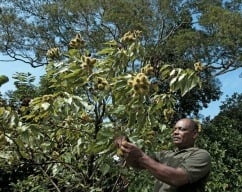Edition 161 – Trails to new worlds
Ecoethnic Tourism Route: a new vector for development in the Southern Bahia Lowlands
1 de August de 2012
Ecoethnic Tourism Route: a new vector for development in the Southern Bahia Lowlands
1 de August de 2012

written by Gabriela Vasconcellos
photos by Almir Bindilatti
Amid the beauty of the Atlantic, the mingled scents of orange and cinnamon trees fill the air, making the trail’s lush vegetation even more exuberant. Ancient trees flank every step, followed by the oil and piassava palms characteristic of the Southern Bahia Lowlands in northeastern Brazil. This is the setting of the first stage of the Ecoethnic Tourism Route, which the Institute for the Sustainable Development of the Southern Bahia Lowlands (IDES) is structuring in that region.

The idea is that visitors will be welcomed by farmers like Juvenal Divino, a resident of the Rio das Matas community in Taperoá, Bahia. A small producer, for the last four years he has guided groups interested in learning about life in this part of rural Brazil. “As I walk through the farm, I talk about different crops and show them what I know, in practice,” he says. For Divino, tourism is an opportunity to increase his family’s income. “I get a daily fee and lots of tips,” he says with a smile.
At the end of the trail, the farmer reveals a gift: the Almas River, which flows unhurriedly past the Bahia municipalities of Taperoá and Nilo Peçanha. In its waters, tourists have the chance to enjoy ziplining and whitewater rafting. The first of three days on that route, offered in partnership with the Ativa Rafting and Adventures agency, comes to an end at the Rio das Matas lodge, where you can fall sleep to the sound of bird songs.
Shortly after dawn on the second day, it’s time to start experiencing the local culture of Nilo Peçanha (284 km from Salvador, the state capital). The first stop is the headquarters of the Pratigi Environmental Protection Area Farmers’ Cooperative (Cooprap), which sells handicrafts, brooms and bio-jewelry made from piassava fiber by local residents. Like the IDES, Cooprap is an institution linked to the Program for the Integrated Development and Growth with Sustainability of the Southern Bahia Lowlands Mosaic of Environmental Protection Areas (PDCIS), supported by the Odebrecht Foundation.
The route goes on. In the Jatimane quilombola community, which was originally established by escaped slaves, tourists have the opportunity to see some more of the rural workers’ routine, like that of Miltaides do Rosário, who was born and raised there. The owner of a restaurant on the Jatimane River, Miltaides offers canoe rides and visits to the nearby waterfalls. “By organizing tourism, I know we’re going to grow. I’ve had a visit from consultants from SEBRAE (the Brazilian Service to Support Micro and Small Enterprises) to conduct a diagnosis and identify our needs,” he says.
According to Márcia Mattos, the Leader of the IDES Cooperative Tourism Alliance, that is the institution’s role. “We are helping the communities network and form partnerships that will help enhance the Ecoethnic Route. We look for professional training courses and marketing support. The idea is to make adjustments that will attract more visitors,” she observes.
The partnership with SEBRAE began in 2011, when the Ecoethnic Route was selected by the Talents of Rural Brazil Project. This initiative is the result of a joint effort between the Brazilian Ministries of Agrarian Development, Tourism and Environment, SEBRAE and the German Cooperation Agency, which is encouraging the inclusion of family farm products and services in tourism. Zenilda do Rosário, also a resident of Jatimane, already has the support of SEBRAE. A shellfish gatherer, she not only participates in training sessions but gets advice about running her restaurant, Restaurante Quilombola Pedro Sorriso, which she named after her husband. As a result, she has made changes in the structure and organization of her establishment. “I’ve learned something new during each session. This is turning us into a role model for the community. Lots of people from all over come here for lunch,” she says. SEBRAE has invited Zenilda to share her experience at an event in the southern state of Rio Grande do Sul. “There I’ll talk about my cassava porridge, my smoked fish and my seafood stew. Those are my specialties.”
After savoring the dishes cooked by Dona Nida, as she is known, our second day on the route ends on Pratigi Beach, in the municipality of Ituberá, Bahia. Roughly 15 km long, it is nearly deserted, with just a few beach shacks as the only signs of human habitation.
A new outlook
Continuing to explore the local culture, on the third and last day tourists have a chance to visit the headquarters of the Zambiapunga folk group, take drumming lessons with the Olopunga group and practice capoeira with the Capoarte group. “We’ve brought together people from all over the Southern Lowlands to present our traditions here. This was our dream, and now it’s coming true,” says Walmório do Rosário, President of the Nilo Peçanha Zambiapunga group.
According to Liliana Leite, Executive Director of the IDES, the Ecoethnic Tourism Route is the first step towards consolidating a unique program. “This region already offers sun and beach tourism. We need to bring visitors in touch with the local culture and strengthen the community’s leading role in that process while raising awareness on the structuring basis of sociobiodiversity,” Liliana explains. “We are seeking harmonious coexistence with nature, combined with the preservation of cultural identity within a producible and sustainable process, thereby establishing agro-ecotourism and providing an additional source income for family units,” she concludes.
Do you wish to be
a partner in our projects, make
a donation or hire our technical consulting?
Send a message
right now!